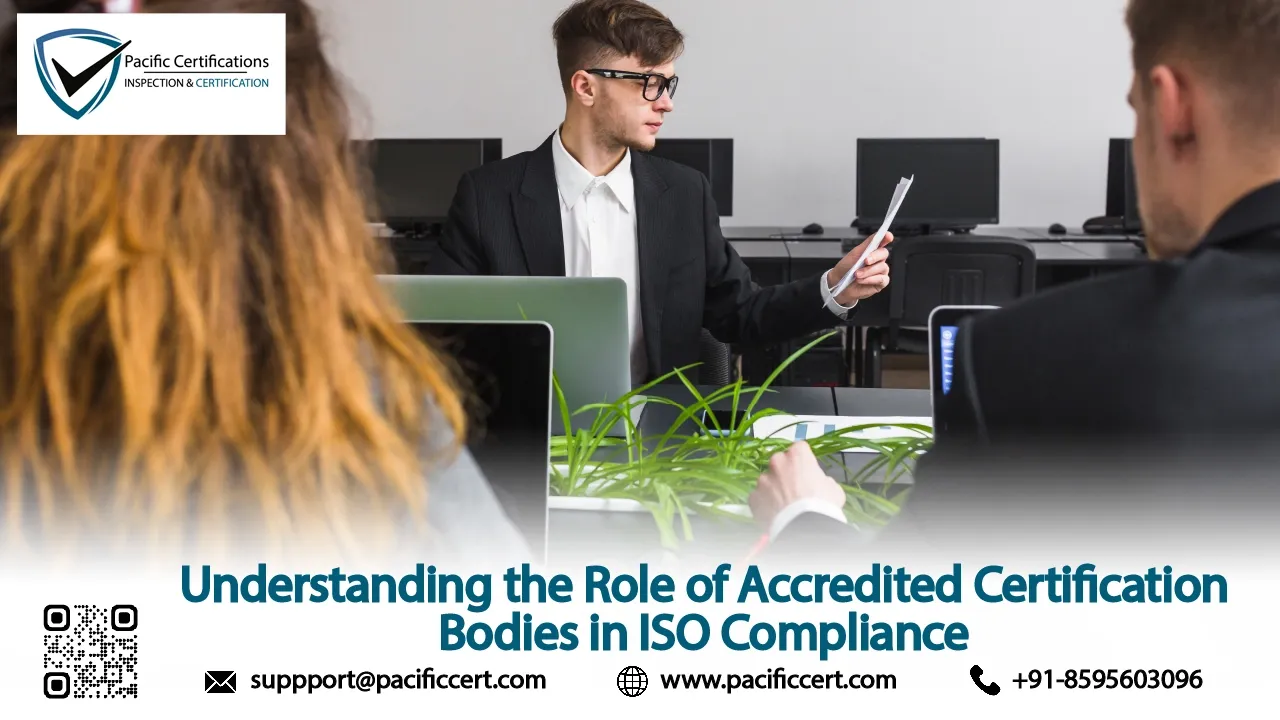Understanding the Role of Accredited Certification Bodies in ISO Compliance

ISO certification is a valuable goal for organizations to establish that they comply with international standards. However, becoming ISO certified isn't simply decided by the organization itself; it requires the use of recognized independent or third-party certification bodies. These certify organizations for ISO compliance as independent, third-party organizations as specified in the ISO certification requirements, that assess and certify (if qualified) to your organization complies with ISO requirements. In this blog, we will discuss the role of the certification body within scope of the ISO certification process and why it is important to select the right certification body to ensure its success.
For assistance, contact us at [email protected].
Introduction
ISO certification gives organizations a framework for continuous improvement to excel in production efficiency, product/service quality, risk management and added credibility with its customers. The process of ISO certification requires organizations to undergo a third-party audit by an accredited certification body. An accredited certification body is licensed to perform audits, verify if an organization meets ISO conformity requirements, and if the organization qualifies, award certifications. So why is the role of the certification so vital? Let's explore in some detail their role, how they become accredited, and what companies should look for when selecting a certification body as well.
What is an Accredited Certification Body?
An accredited certification body is a body that is recognized as capable of evaluating and verifying compliance with ISO standards by an independent accreditation body. Accreditations confirm that a body is competent, impartial and operating in accordance with international standards.
Accredited certification bodies are evaluated very thoroughly by others. To become accredited, a certification body must be evaluated by an accreditation body such as UKAS (United Kingdom Accreditation Service) or ANSI (American National Standards Institute). The evaluation involves an assessment of the body’s audit processes, qualifications of the auditors, and ability to meet ISO’s strict limitations on auditing practices.
The Role of Accredited Certification Bodies
Accredited certification bodies conduct a number of important functions throughout the ISO certification process. These include:
1. Conducting audits and assessments
The main function of a certification body is to carry out audits, so that it can assess whether an organization is meeting the relevant requirements specified by the ISO standard. The certification body will assess an organization’s processes, policies, and procedures to ensure their compliance with the ISO requirements. At the conclusion of the audit, the certification body will produce a report that either recommends certification or identifies non-conformities requiring corrective action.
2. Confirming Conformity
Accredited certification bodies confirm that the organization is effectively implementing the required systems and processes. They will ensure that your organization upholds the principles laid out in the ISO standard, that documentation, records and controls are in place. They will also ensure that the organization is continuing to improve processes in line with ISO standards. The confirmation process is important to ascertain that ISO certification is being earned and not awarded without proper evaluation.
3. Keeping Impartiality and Objectivity
An accredited certification body is impartial and objective. They are there to confirm that an organization has fulfilled the requirements imposed by the ISO standard once again determining conformity without bias or conflict of interest. Impartiality can confirm that the certification process is equitable, transparent and credible. This means businesses can have confidence that certification body makes decisions objectively based on the evidence gathered during the audit process.
4. Issuing ISO Certification
Once the audit is complete and it is confirmed that there is conformity to the ISO standard, the certification body may issue the ISO certificate. The certificate is the official document that shows the organization conforms with the ISO standard and can be used to show your organization's commitment to quality, safety, environmental management, or any other issue area influenced by the ISO standard.
5. Carrying Out Surveillance Audits
ISO certification is not a one-off event, organizations must maintain compliance to keep their ISO certification. Accredited certification bodies conduct surveillance audits to ensure that your organization still meets all of the ISO requirements. Surveillance audits happen generally once a year and consist of reviewing documents and processes that are still going on. The certification body will also consider any changes your organization may have made to determine if anything has affected your compliance with the ISO standards.
Surveillance audits provide assurance that your organization is not only maintaining its high standards, but is also continuing to improve over time, consistent with the requirements of ISO certification.
For assistance, contact us at [email protected].
Why Choosing the Right Certification Body Is Important?
For your ISO certification journey to be effective, choosing the right accredited certification body is an important part of the process. Here is why it is important:
1. Credibility and Recognition
The certification body you choose should be accredited by an appropriate accreditation body. Accreditation means the certification body operates in accordance with international standards and has qualified auditors. Certification granted by a body that is recognized adds value to the ISO certification you received and is more credible when presented to customers, stakeholders and regulatory authorities.
2. Experience and Industry Knowledge
Each industry will have its own challenges and requirements. Choosing a certification body that has experience in your industry will ensure that the auditors understand the specific needs and regulations of your industry. No matter if you are part of the manufacturing, healthcare, or IT industries, auditors that have experience in your industry will understand the intricacies for your audit process, thereby allowing the audit to be more effective and smooth.
3. Cost and Value
The cost of ISO certification will vary across certification bodies, the type of audit, and the size of your organization. While the cost of ISO certification is important to consider, value is the most important consideration when choosing a certifying body. Selecting a certifying body with cost as the only factor may result in inadequate audits and poor customer service. Look for certifying bodies that balance competitive rates, industry experience, and quality service.
4. Post Certification Support
Once you have received ISO certification, your organization may need assistance to continue to comply with ISO requirements. A good certification body should continually support the customer, by offering training materials, corrective action guidance, and continuous improvement advice and guidance. Look for a certification body that provides post-certification support services to help you maintain compliance, and help you keep your certification status current.
Contact Us
Pacific Certifications is here to guide your organization through the ISO certification process. Whether you need help understanding the standards, implementing them, or preparing for audits, our team of experts is ready to support you at every stage.
For assistance, contact us at [email protected].
Visit our website at www.pacificcert.com.
FAQs
Q1: How do I choose the right certification body for my business?
Look for an accredited certification body with experience in your industry. Ensure they have the necessary qualifications, adhere to international standards, and offer competitive pricing and good customer support.
Q2: How long does the ISO certification process take?
The ISO certification process typically takes between 3 to 12 months, depending on your organization's size and the complexity of the standard you’re pursuing.
Q3: Can I switch certification bodies after getting ISO certified?
Yes, organizations can switch certification bodies, but it’s important to ensure that the new certification body is accredited and recognized by an appropriate accreditation body.
Q4: How often are surveillance audits conducted?
Surveillance audits are usually conducted annually to ensure your organization continues to meet ISO standards and remains in compliance with the certification requirements.
Ready to get ISO certified?
Contact Pacific Certifications to begin your certification journey today!
Suggested Certifications –
Read more: Pacific Blogs

